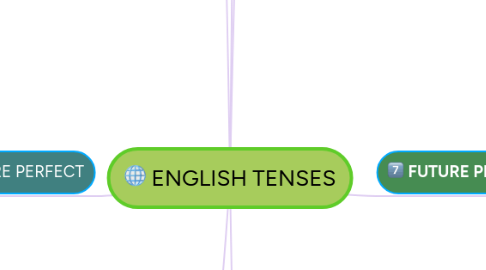
1. WILL
1.1. USES
1.1.1. Express a Voluntary Action
1.1.2. Express a Promise
1.1.3. Express a Prediction
1.2. STRUCTURE
1.2.1. Subject + will + Verb
1.2.1.1. I will send you the information
1.2.1.2. I'll make some sandwiches.
1.2.1.3. I'll get it.
1.2.2. Subject + will not / won’t + Verb
1.2.2.1. I won't do all the housework myself!
1.2.2.2. I will not do your homework
1.2.2.3. You will not help him later.
1.2.3. Will + Subject + Verb + ?
1.2.3.1. Will you make dinner?
1.2.3.2. Will you help him later?
1.2.3.3. Will you ever help him?
2. FUTURE CONTINUOUS
2.1. USES
2.1.1. Interrupted Action in the Future
2.1.2. Specific Time as an Interruption in the Future
2.1.3. Parallel Actions in the Future
2.2. STRUCTURE
2.2.1. Subject + WILL + BE + Verb-ING
2.2.1.1. I will be watching TV when she arrives tonight.
2.2.1.2. I will be waiting for you when your bus arrives.
2.2.1.3. I am going to eat dinner.
2.2.2. Subject + WILL + NOT + BE + Verb-ING
2.2.2.1. You will not be waiting for her
2.2.2.2. She will not (won’t) be starting
2.2.2.3. I will not (won’t) be sitting
2.2.3. WILL + Subject + BE + Verb-ING+?
2.2.3.1. Will you be loving me?
2.2.3.2. Will you be waiting for me?
2.2.3.3. Will it be raining at this time tomorrow?
3. FUTURE PERFECT
3.1. USES
3.1.1. Completed Action Before Something in the Future
3.1.2. Duration Before Something in the Future
3.2. STRUCTURE
3.2.1. Subject + WILL + HAVE + Verb past participle
3.2.1.1. They won’t have been maried by next year.
3.2.1.2. By that time I will have finished my homework.
3.2.1.3. They’ll have relaxed by night.
3.2.2. Subject + WILL + NOT + HAVE + Verb past participle
3.2.2.1. He will not (won’t) have received enough score by the summer.
3.2.2.2. They will not (won’t) have been maried by next year.
3.2.2.3. The rain will not (won’t) have stopped by tomorrow.
3.2.3. WILL + Subject + HAVE + Verb past participle + ?
3.2.3.1. Will he have finished his work by 5 o’clock?
3.2.3.2. Will they have sent an email until tomorrow?
3.2.3.3. Will people’s lives have changed by ten years?
4. GOING TO
4.1. STRUCTURES
4.1.1. Subject + TO BE + going to + verb
4.1.1.1. Michael‘s going to buy a new short.
4.1.1.2. I‘m going to see him tonight.
4.1.1.3. We‘re going to be crazy.
4.1.2. Subject + TO BE + not+ going to + verb
4.1.2.1. He‘s not going to stay at the hotel.
4.1.2.2. I‘m not going to see him tonight.
4.1.2.3. They aren’t going to get a card.
4.1.3. TO BE+ Subject+ going to+ verb+?
4.1.3.1. Are you going to come?
4.1.3.2. Are we going to run?
4.1.3.3. Am I going to dance?
4.2. USES
4.2.1. make predictions
4.2.1.1. when we can see something is about to happen.
4.2.2. indicate planned actions
5. PRESENT SIMPLE
5.1. USES
5.1.1. Repeated Actions
5.1.2. Facts or Generalizations
5.1.3. Scheduled Events in the Near Future
5.1.4. Now
5.2. STRUCTURE
5.2.1. Subject + verb
5.2.1.1. I talk.
5.2.1.2. He eats
5.2.1.3. They learn
5.2.2. Subject+auxiliary verb(to do) +not+ verb.
5.2.2.1. I do not talk.
5.2.2.2. He does not eat.
5.2.2.3. They do not learn.
5.2.3. Auxiliary verb (to do) + subject + verb +?
5.2.3.1. Do you talk?
5.2.3.2. Does he eat?
5.2.3.3. Do they learn?
6. PRESENT CONTINUOUS
6.1. USES
6.1.1. Repetition and Irritation with "Always"
6.1.2. Longer Actions in Progress Now
6.1.3. Near Future
6.2. STRUCTURE
6.2.1. Subject + to be + verb + ing.
6.2.1.1. I’m talking.
6.2.1.2. He’s eating.
6.2.1.3. They’re learning
6.2.2. Subject + to be +not+ verb + ing.
6.2.2.1. I’m not talking.
6.2.2.2. He’s not [He isn’t] eating.
6.2.3. to be + subject + verb + ing +?
6.2.3.1. Are you talking?
6.2.3.2. Is he eating?
6.2.3.3. Are they learning?
7. FUTURE PERFECT CONTINUOUS
7.1. USES
7.1.1. Duration Before Something in the Future
7.1.2. Cause of Something in the Future
7.2. STRUCTURE
7.2.1. Subject + WILL + HAVE BEEN + Verb-ING
7.2.1.1. She will have been sleeping at home for two hours when we arrives.
7.2.1.2. He will have been playing the guitar for ten years when he turn twenty.
7.2.1.3. They will have been teaching German for 5 years by the end of this year.
7.2.2. Subject + WILL NOT + HAVE BEEN + Verb-ING
7.2.2.1. I will not (won’t) have been shopping on Tuesday.
7.2.2.2. He will not (won’t) have been playing football tomorrow evening.
7.2.2.3. They will not (won’t) have been going for a picnic.
7.2.3. WILL + Subject + HAVE BEEN + Verb-ING + ?
7.2.3.1. Will you have been making a cake in the kitchen?
7.2.3.2. Will they have been playing tennis since morning?
7.2.3.3. Will you have been working for a long time?
